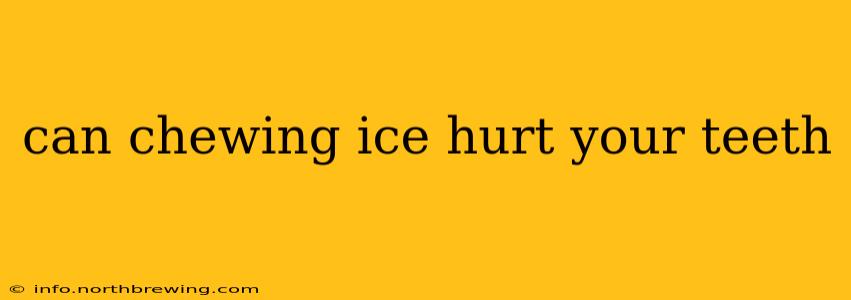Chewing ice may seem harmless, even refreshing, but the reality is that this seemingly innocent habit can significantly damage your teeth. The hard, brittle nature of ice creates a considerable risk of fracturing enamel, chipping teeth, and even causing more serious dental problems. This article delves into the potential consequences of chewing ice, explores preventative measures, and addresses frequently asked questions surrounding this common practice.
What Happens When You Chew Ice?
The enamel covering your teeth, while the hardest substance in your body, is not indestructible. When you chew ice, the force exerted on your teeth, combined with the hardness of the ice, can lead to:
- Cracked or Fractured Teeth: Ice crystals can create hairline fractures in your teeth, often invisible to the naked eye initially. These micro-fractures can weaken your teeth over time, making them more susceptible to further damage and eventual breakage.
- Chipped Teeth: Larger chunks of ice can cause noticeable chips or breaks in your teeth, leading to sensitivity, pain, and the need for costly dental repairs.
- Worn Enamel: The abrasive nature of ice gradually wears away your tooth enamel, leaving your teeth more vulnerable to cavities and decay. This process is often gradual, making it easy to miss until significant damage occurs.
- Increased Sensitivity: Once the enamel is compromised, your teeth's dentin layer becomes exposed, increasing sensitivity to hot, cold, sweet, and acidic foods and drinks.
Can Chewing Ice Cause Toothaches?
Yes, chewing ice can absolutely cause toothaches. The damage inflicted on your teeth, whether it's a crack, chip, or worn enamel, can lead to various types of toothaches. Pain can range from mild discomfort to sharp, throbbing sensations. If you experience a toothache after chewing ice, it's crucial to see a dentist promptly to assess the extent of the damage.
Is it Bad to Chew Ice Every Day?
Daily ice chewing significantly increases your risk of all the dental problems mentioned above. The cumulative effect of consistent, forceful chewing on ice can lead to substantial long-term damage. Consider it like repeatedly hitting a rock with a hammer—eventually, the rock will break. Your teeth are similarly susceptible to repeated stress from ice chewing.
How Can I Stop Chewing Ice?
Breaking a habit like ice chewing requires conscious effort and potential strategies to manage cravings or underlying issues:
- Identify Triggers: Understanding why you chew ice (e.g., boredom, anxiety, oral sensory issues) can help address the root cause.
- Find Alternatives: Explore healthier substitutes, such as chewing sugar-free gum, drinking plenty of water, or engaging in a different activity to distract yourself.
- Gradual Reduction: Instead of quitting cold turkey, try reducing the amount of ice you chew gradually over time.
- Mindfulness: Pay attention to when you reach for ice and consciously make a different choice.
- Professional Help: For underlying conditions contributing to the habit, consider consulting a therapist or healthcare professional.
Can I Repair Teeth Damaged from Chewing Ice?
While some minor damage might heal naturally, more significant cracks, chips, or enamel wear often require professional dental intervention. Depending on the severity of the damage, treatment options might include:
- Dental Bonding: For minor chips or cracks, a dentist can apply a composite resin to repair the affected area.
- Dental Crowns: Larger cracks or extensive damage may require a dental crown to protect and restore the tooth's function.
- Root Canal: If the damage reaches the pulp (the soft inner part of the tooth), a root canal may be necessary to prevent infection.
- Extraction: In severe cases, extraction might unfortunately be unavoidable.
Conclusion:
Chewing ice may provide a fleeting sensation of coolness, but the potential for long-term tooth damage significantly outweighs the short-lived pleasure. Protecting your dental health is an investment in your overall well-being. By understanding the risks and actively avoiding ice chewing, you can safeguard your smile and prevent costly and potentially painful dental procedures. If you’re concerned about any damage already inflicted, schedule an appointment with your dentist for a thorough examination and appropriate treatment.
